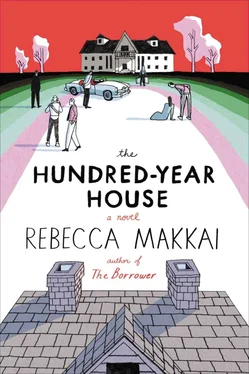Grace said, “Max, I’m going to ask a favor of you. Amy’s been here quite a while now, and it’s time for her to move on. You know she’s become a terrible distraction to everyone. I think she’s begun stealing things, as well.”
“You’d be out a cook.”
“She’s no cook. And you’ve seen how unhappy she’s been, these past few days.” Max looked puzzled, and she wondered if Amy and Beatrice had managed to keep all the hysterics from him. “Don’t you think you can send her home now?”
He rested his hands on his legs as if he were keeping them still only through great effort. “It would be difficult.”
Grace reached into her coat pocket and brought out a key ring with four small keys. “I thought I’d offer you my keys to the artists’ studios. You could use them however you’d like. You know—” and she was glad he was gazing out at the grounds in confusion, and not at her “—sometimes I think about those boys at the college. I worry about them, so far from home. If you meet any who are in need of a good meal, or a place to rest, you could invite them to visit you here, and they might even use the daybeds in the studios. Surely there’s someone who wants a quiet space.”
She hadn’t been sure, when she’d rehearsed this, what his reaction might be. Shame, perhaps, and a grateful exchanging of favors. Or he might be angry and take it as blackmail, which would work as well. She wasn’t prepared for him to turn and grin at her. She’d never even seen such an expression on his face. All the composure, all the reserve she’d come to know as Max, fell away in that moment, and she was looking at someone she’d never met.
“I already have keys,” he said. “You should hold on to those.”
“She’s not your niece,” Grace said.
“Not technically.”
“But she’ll listen to you. I don’t imagine she’s in love with you.”
He laughed softly. “No. She’s quite naïve, I think. She’s not like you, she doesn’t realize how I am, but she’s fond of me. And Grace, I’ll say quite plainly that I won’t send her home.” Only a moment later did she realize that he’d not only defied her, he’d called her Grace. And what could she do about any of it? Threaten to tell her father, when she had no idea what history lay between them? If she couldn’t dismiss him, and he wouldn’t do what she said, then it was quite obvious that he was really the one in charge. He said, “Some fellow brought her to Chicago, is what happened. He convinced her to leave Florida with him, which, from what I understand, likely saved her life. But it turned disastrous. As those things tend to. She’s only eighteen. Do you know how she came to us? Beatrice found her outside the gate, peering in. She’d been knocking on every door down the street, looking for work. She’s remarkably resourceful. In Chicago, before she left the man, she asked around where the nicest houses were, and someone said she ought to come up here. She told me she figured that even if she failed, no one in a small town would let her sleep on the street. Whereas in the city… She’d been to a hundred houses before she met Beatrice.”
“How lucky that she found us.” She was amazed, really, at how sharp her voice was, how mean. It was exactly like her mother’s.
“This has always been a place for strays. The people who need to find Laurelfield always find it. Listen, Grace, she’s got nothing back home. A horrible family. A whole family of Georges. I can’t send her.”
“Why don’t you just marry her, then? If you care more about Amy than your employment here. Are you capable of being with a woman? It would be a happier marriage than some, even if it were a farce. And then you could keep her out of everyone else’s business, and maybe you could leave alone poor Sid Cole of Indianapolis.”
Max did look startled now, and perhaps Grace shouldn’t have let on that she had Sid’s name. He’d been impressed with her intuition, her worldliness, and now he knew she was just a snoop. He stood, and at first she thought he was stalking off, but he came instead and knelt down in front of her chair, right on the stone floor, right in the dead leaves.
He said, “You don’t look good.”
It ought to have insulted her greatly, but it didn’t. Maybe it was a relief to have someone in charge, someone who cared if she lived or died. He was trying to get her to look at him, right at him. That was why he’d gotten down so low. And she couldn’t do it. She looked over his shoulder, out at the dry fountain.
“Grace,” he said. “Aren’t you the one who needs to get out of here?”
She kept staring until the fountain became a gray blur, no closer or farther than the trees beyond.
“Grace. We’re similar, you know. Maybe it’s something I shouldn’t say, but it’s true. Did you read that poem?”
“It didn’t apply.”
“The point is to reinvent yourself.”
She felt like reaching out to touch Max’s dark hair. She might push a small dent into it with her finger, and it might stay that way. Instead she stood to leave, while she still had some small remnant of dignity.
He said, “I’d marry you myself.”
“That’s very kind.”
—
Saturday was Guy Fawkes Day. No one in the States seemed to celebrate it, but when George showed up at breakfast — Grace was mildly surprised to see him, as he hadn’t slept in their bed — she suggested they do a bonfire that night. The burn pile was so tall.
George said, “That’s a fine plan.”
He was lit by the sun, black curls in every direction, eyes bright green and unclouded. She loved him at breakfast. If she kissed him she would taste like Listerine, and when he stretched his arms and back she could hear the cracks. In the morning he was like a small, clean snowball — one that would roll downhill all day, picking up rocks and darkness and growing enormous and sharp.
A shaking Amy brought coffee without looking at either of them. It smelled terrible, acrid and offensive, and Grace thought she might retch. She said, “Amy, can you take this away? There’s something wrong with it.”
George tasted his. “It’s perfectly fine.”
But Grace handed her cup to Amy, who hurried it back to the kitchen.
“If you drop dead from poison, I’ll know who did it,” Grace said.
—
Grace asked Ludo to plan the bonfire, and she thought she and George might even have dinner on the inner terrace, after the blaze was going. But by three in the afternoon George was roaring drunk, and he found her sitting on the bed with the telegram that had just arrived from Toronto. All it said was FATHER WORSENING, PLEASE ADVISE IF COMING, but she couldn’t keep from staring at it, as if it would update itself every time there was a change, every time her father sat up to eat a bite of soup. George yanked it from her and she told him what was happening, but that she didn’t think she’d go.
“They’re lying to you,” he said. “He’s not sick. They want to get you up there and lock you in a closet.”
“That’s not fair.”
“No. Exactly.”
“That isn’t — George, what are you doing?”
Because now George was shredding the telegram, pouring the shreds into the ashtray on his bureau, and lighting them with a match. She thought of yelling or grabbing it, but then he might throw the whole thing, still on fire. So she waited till it had smoldered to nothing. Then she said, “That wasn’t necessary.”
“ Ha! What do you do, all day long? You sit in that attic, mooning over your grandfather’s precious files, then you sit at dinner staring at your lunatic grandmother.”
“They aren’t my grandfather’s files.”
“And where the hell are we? We’re in a — we’re on an altar . This place is an altar to your family. How is this supposed to be my house when it’s the Devohr International Museum?”
Читать дальше












